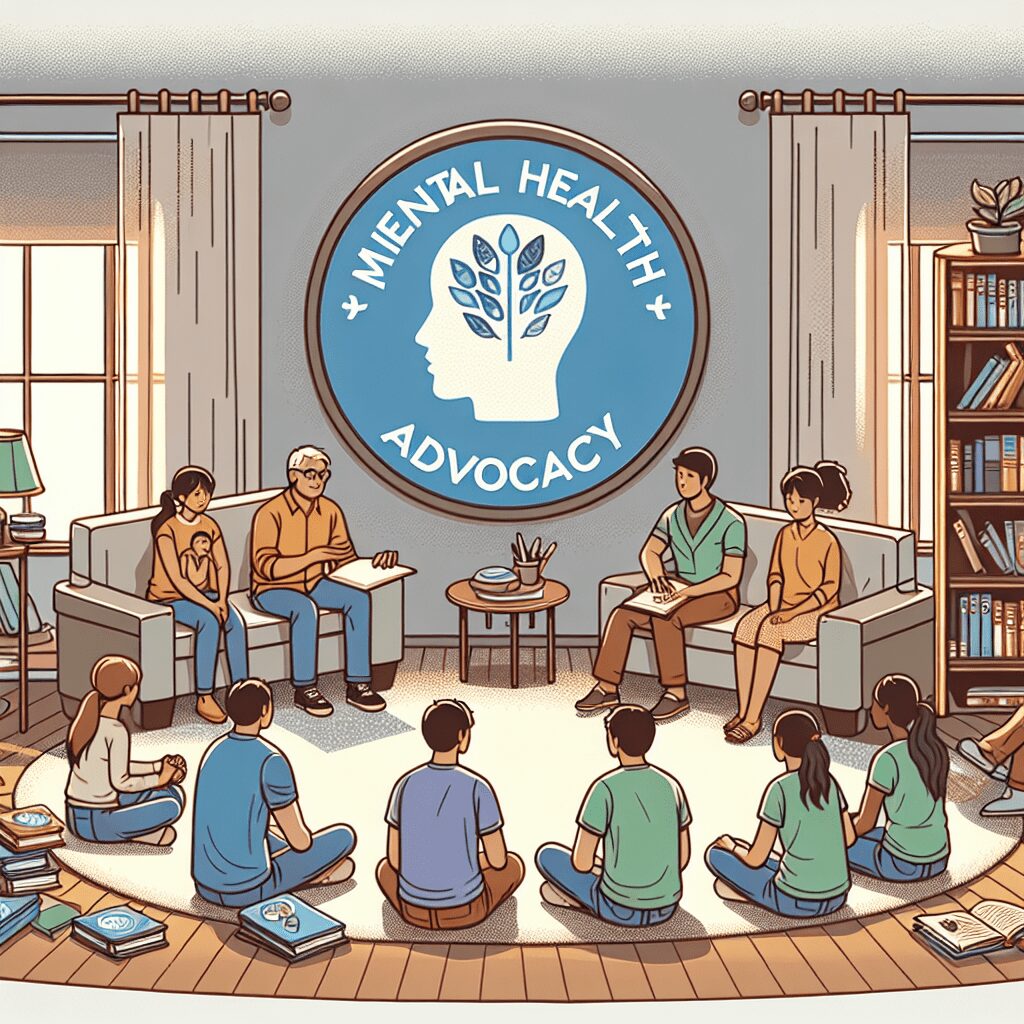Understanding Mental Health Advocacy: A Crucial Guide for Families
Mental health advocacy is a vital journey that affects not just individuals who are coping with mental health challenges, but also their families and communities. As a life coach passionate about fostering resilience and understanding, I have seen firsthand the impact that mental health advocacy can have on families. It empowers them, educates them, and equips them to support their loved ones more effectively. In this blog post, we’ll dive deep into understanding mental health advocacy, providing you with practical guidance you can use to help create a supportive environment for your loved ones.
Chapter 1: Understanding Mental Health and Its Importance
Mental health encompasses emotional, psychological, and social well-being. It influences how we think, feel, and act. It plays a crucial role in every stage of life—from childhood and adolescence through adulthood. Understanding mental health is the first step towards advocacy. The statistics are staggering: one in five adults experiences mental illness each year, and mental health disorders are among the most common health issues facing children today.
For families, recognizing the signs of a mental health crisis can be life-altering. Sometimes these signs manifest subtly, such as withdrawn behavior, mood swings, or changes in eating and sleeping patterns. By educating ourselves about mental health, we learn to recognize these signs and understand that they may not just be phases but rather underlying issues that require attention and care.
Chapter 2: The Role of Advocacy in Mental Health
Mental health advocacy involves actions aimed at improving the mental health landscape for individuals, families, and communities. It includes raising awareness, providing resources, and lobbying for better mental health policies. Advocacy can be personal, local, or even national:
-
Personal Advocacy – Supporting a loved one through their mental health challenges involves listening, providing comfort, and encouraging professional help when necessary.
-
Local Advocacy – Joining or forming support groups, participating in community education, and promoting resources in local schools and clinics can foster a supportive environment.
-
National Advocacy – Supporting policies that protect mental health rights, funding for mental health services, and reducing stigma associated with mental illness can lead to systemic changes that benefit many.
Chapter 3: Essential Skills for Mental Health Advocacy
Being an advocate for mental health requires specific skills that empower families to support their loved ones effectively. Here are some crucial skills:
-
Active Listening – Genuine listening recreates a safe space for communication. It signals that you care and are available to help.
-
Effective Communication – Clearly expressing feelings, concerns, and needs fosters understanding and reassurance.
-
Educating Yourself – Knowledge is power! Understanding mental health disorders, treatments, and available resources equips families to navigate challenges more effectively.
-
Empathy – Practicing empathy allows you to connect with your loved one’s experiences without judgment, making them feel heard and valued.
-
Patience – The journey of mental health recovery can be long and winding. Patience is essential in understanding that setbacks are part of the process.
Chapter 4: Building a Support Network
Support networks are crucial in advocacy and mental health recovery. Encourage family members to reach out to others who may be experiencing similar challenges. This may include:
-
Therapists and Counselors – Professional mental health providers can offer expert advice and guidance.
-
Support Groups – Many organizations, both virtual and in-person, create spaces for families to share experiences and strategies.
-
Friends and Family – Building a strong support system within your circle is invaluable. Inform them of what your loved one needs from them.
-
Online Communities – In today’s digital world, many platforms offer resources, encouragement, and connectivity for those dealing with mental health issues.
Chapter 5: Navigating the Mental Health System
The mental health system can be complex and confusing for families. Knowledge of your rights, available resources, and support systems is crucial to successfully navigating it. Here are steps to consider:
-
Know Your Rights – Familiarize yourself with local laws and regulations regarding mental health treatment and patient rights.
-
Research Resources – Identify local mental health services, therapists, and hospitals. Reach out to national organizations that provide resources.
-
Understand Insurance Options – Investigate what mental health services are covered under your insurance plan. Be proactive in asking for coverage specifics.
-
Seek Professional Help – Determine the right kind of professional help for your loved one. Whether it’s therapy, medication, or support groups, guidance from professionals can make a significant difference.
Chapter 6: Addressing Stigma and Misconceptions
Stigma surrounding mental health remains a formidable barrier to accessing services and support. Families can play an influential role in combating this stigma by promoting open conversations, sharing personal stories, and educating others. This involves:
-
Speaking Up – Don’t remain silent about mental health issues. Share experiences to normalize conversations and dispel myths.
-
Creating Safe Spaces – Foster environments where those suffering from mental health issues feel comfortable sharing their feelings and experiences.
-
Educating Others – Use clear facts and personal narratives to enlighten friends and family about mental health issues.
-
Encouraging Professional Help – Actively encourage families and friends to seek help when they need it.
Chapter 7: Self-Care for Caregivers
As a caregiver or advocate, prioritizing your health is just as essential as supporting your loved one. The strain of caring for someone with mental health challenges can lead to burnout if you’re not careful. Here are ways to practice self-care:
-
Set Boundaries – Knowing when to step back is vital. Establish healthy boundaries to avoid overwhelming yourself.
-
Seek Support – Consider joining caregiver support groups or finding a therapist for yourself.
-
Engage in Activities – Prioritize hobbies and activities that recharge you emotionally and mentally.
-
Maintain Your Well-Being – Eating well, getting enough sleep, and engaging in physical activity can significantly affect your emotional resilience.
Chapter 8: Steps Towards Empowerment
Finally, true advocacy is about empowerment. Advocate not just for your loved one but for yourself as a family member and caregiver. Empowerment takes on many forms:
-
Fostering Independence – Encourage your loved one to take ownership of their mental health journey—it’s important for them to feel in control.
-
Developing Coping Strategies – Work together to create strategies for managing emotions and triggers effectively.
-
Setting Realistic Goals – Establish achievable goals related to treatment and recovery to keep everyone focused on progress.
-
Celebrating Progress – Recognize and celebrate small victories, be it personal growth or progress in managing mental health. Positive reinforcement boosts morale.
Conclusion
Understanding and implementing mental health advocacy is essential for families navigating the complexities of mental health issues. This journey of advocacy is not just about handling crises, but about fostering an inclusive, supportive environment in which your loved ones can thrive. By cultivating compassion, knowledge, and resilience, we can all become stronger advocates for mental health.
Advocacy starts at home. It extends outward to the community and even the broader national landscape. Families must work together, share knowledge, and uplift one another while supporting their loved ones. As we move forward, let’s continue to cultivate a culture of openness, acceptance, and understanding towards mental health. With a collective effort, we can make a difference.
FAQs
1. What is mental health advocacy?
Mental health advocacy involves efforts to improve access to mental health resources and services, reduce stigma, and create supportive environments for individuals with mental health challenges.
2. Why is mental health important?
Mental health is crucial because it affects how we think, feel, and behave. It impacts our ability to cope with stress, relate to others, and make choices.
3. How can families support a loved one facing mental health issues?
Families can support their loved ones by listening, educating themselves about mental health, encouraging professional help, and fostering open dialogue.
4. What are signs of mental health distress?
Signs may include changes in mood, withdrawal from social interactions, changes in behavior, difficulties sleeping, and changes in appetite.
5. How can we combat stigma surrounding mental health?
Open conversations, education, and sharing personal experiences can help normalize mental health discussions and reduce stigma.
6. What resources are available for families?
Many communities offer support groups, online resources, educational workshops, and professional services. Local mental health organizations can provide guidance.
7. How can caregivers practice self-care?
Caregivers can practice self-care through setting boundaries, engaging in hobbies, seeking support, and maintaining their physical and emotional health.
8. How can families empower their loved ones?
By encouraging autonomy, developing coping strategies, setting realistic goals, and celebrating even small progress, families can empower their loved ones on their mental health journey.
Instantly Access Your Free Children’s Books Here! (https://payhip.com/BlueCherryStore) – Disclaimer: I may earn a commission from qualifying purchases as an affiliate. Please note that I only recommend products I believe will provide value to my readers. (M)









